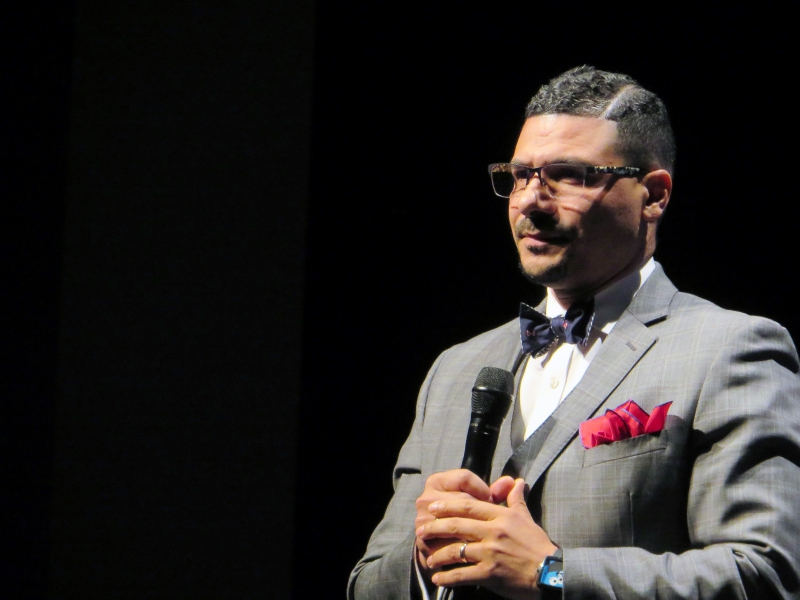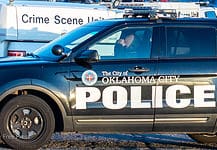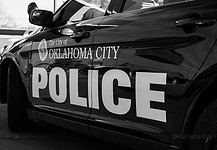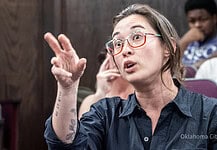Last Updated on January 28, 2017, 11:14 AM | Published: January 28, 2017
Oklahoma Lt. Governor Todd Lamb seemed to express the essence of the school choice movement Thursday night in a closing speech at the first School Choice Summit held at Oklahoma City Community College.
“Parents know better than government,” Lamb said about who should decide where children go to school.
Free Press attended the entire conference made up of small, breakout sessions early and then closing with several presentations in the Visual and Performing Arts Center.
The conference was organized by Choice Matters, a local organization that promotes loosening state control and regulation and allowing more private and charter schools to operate in Oklahoma.
Human rights
The part of the conference that could have surprised some who are against school choice was the panel entitled “Communities of Color.”
The main speaker for the end of the evening, Dr. Steve Perry, was on that panel and informally made some of the points that he made later in his speech in front of all conference participants.
Perry is Head of Schools at Capitol Preparatory Schools in Connecticut and New York. The schools he oversees have produced impressive results from students who come from poverty and difficult life circumstances.
His first statement was blunt and delivered without reserve.
“It is becoming increasingly difficult for the other side to make the lies stick for much longer.” Later he explained that “the other side” was the established public education system and the “teachers’ unions” who he perceived to be more concerned for their own status than the future of the students.
His statements showed enthusiasm for the work, but also the frustration with the heavy traditional school model in place now. He believes the traditional school model had a clear intent of maintaining differences and a stratified society.
“We are using a system that was designed in 1635 to keep certain communities apart,’ Perry said.
“Parents from disadvantaged populations have shown us that they do care about education,” Perry said in opposition to assumptions that black people are not interested in their children receiving an education.
He said that he cannot believe that black youth are not capable of being educated at a high level and directly opposes that assumption.
“If we leave it to the system to fix itself it will never. So, we need to put the power in the hands of the people who truly love their children: the parents,” Perry said.
His perspective is foreign to those who have not lived in or been close to neighborhoods where the traditional public schools are in constant crisis and the education students receive is poor even in the good years.
Perry gave a more passionate and full version of the same concepts in his keynote speech at the end of the evening.
Excitement, frustration
Free Press caught up with Chris Brewster, Superintendent of Santa Fe South charter school after Perry’s speech at the end of the evening.
His school serves the south side of Oklahoma City where poverty and cultural challenges are numerous.
Brewster seemed to embody the mixed feelings of excitement and frustration that were expressed in so many ways and so often at the conference. He has been in the process of promoting parent choice for close to a decade now.
“It feels like a bit of a tipping point and the galvanizing of those who’ve been fighting for this shift in power from the institution back to the family,” he said.
“It was encouraging and focusing that sometimes while the discourse should be civil, the fight can be very intense when we continue to help these kids and work with them.”
Brewster formerly taught at Capitol Hill High School in Oklahoma City Public Schools. He turned down a promotion to principal and instead, started the charter school Santa Fe South High School in 2011.
Protest
If there were any participants at the School Choice Summit Thursday night who supposed it would just be another sleepy conference, they were proved wrong by the end of the evening.
Close to time for the main program to begin in the auditorium something or someone triggered a fire alarm in the Visual and Performing Arts Center. The fire department found no fire and the conference went on.
It added to an already tense day due to warnings earlier in the week that the conference might be disrupted.
Then, a group of about 20 noisy protesters arrived. They tried to enter the main exhibit hall outside the auditorium where the closing activities were to be held in the Visual and Performing Arts Center.
Organizers balked at the tickets protesters showed the entry desk workers and did not let them pass on into the event. Entry to the event was only through one door with campus police nearby.
And so, that’s where the protest was held.
“This is funded by the Koch Brothers! This is funded by ALEC! This is funded by the Walton family! This is funded by Betsy DeVos, who is about to be confirmed as Trump’s secretary of education,” shouted Mark Faulk, a well-known local activist on the political left and one of the organizers of the protest.
Free Press captured this encounter.
Choice Matters is controversial in some circles that support traditional public schools. The Walton Family Foundation has given financial support for the group in the past.
The foundation has given money to organizations in multiple states to push for more state money to shift to support of charters. It promotes competition between charters and traditional public schools.
About five to six uniformed and plainclothes campus police stood nearby carefully watching the group. At one point two of the campus officers told the protesters that organizers did not want them to come into the event.
From the arrangement of only one door into the event, organizers and campus police seemed to be ready for the group’s arrival.
Earlier in the week a Facebook group called “Red State Revolt” had posted an “Occupy Education” event on its page encouraging supporters to come out and disrupt the event.
Eventually members of the Oklahoma City Police Department arrived mostly because the protesters called them. Some of the protesters said they were afraid of the campus police and wanted the OKCPD there to ensure their safety.
The group stayed at the entry desk for about 45 minutes occasionally engaging in loud arguments with two photographers who refused to identify themselves or even who they were working for.
Many of the conference participants avoided that part of the lobby as they moved on to the main program in the auditorium.
Ongoing tension
It was a small sampling of the ongoing tension in Oklahoma and nationally about the role and place of charter schools, homeschooling, private schools and vouchers in pre-K through 12th grade education.
Proponents of traditional public schools fear already limited funds will be peeled away from them to support the growing number of charter schools promoted in part by large, national foundations funded by America’s wealthiest people such as the Walton Family.
Indeed, some states that transitioned to a more open system several years ago, have been taken advantage of.
At the insistence of well-funded lobbyists, some states have allowed charters to multiply in excess. Some schools then took state funds only to go bankrupt and close midyear, educationally stranding students and parents.
Such states have struggled with large, national school management corporations that seem to value only public tax money and not the students they claim to serve.
Charter school proponents see traditional school administrators and teachers’ unions as standing in the way of innovation, too satisfied with only partial success.
Background
Traditional public schools have geographic attendance districts and attendance is mandatory. They are funded with taxes and controlled by state laws and oversight.
Charter schools are partially funded by the state, but also by other funding sources like foundations and private interests. They are only partly controlled by state laws. Some have defined attendance districts and others do not. States continue to struggle over just how much oversight will ensure the well-being of students and still allow for innovation.
Oklahoma requires that charters operate under the authorization of a university. In the past few years Oklahoma City Public Schools has been allowed to authorize their own charters. Eleven operate under OKCPS supervision.
Private schools have always been separate from the state.
The longest-running, and best organized private school efforts in Oklahoma have been by the Roman Catholic Church, a Christian denomination with a deep tradition of providing a private education that includes instruction in doctrine.
Parents have been allowed to school their own children in Oklahoma since statehood. However, it was not common until the early 1980s when some groups started promoting it. At the same time, publishing companies began publishing materials designed for homeschooling making the process much easier. With ease and promotion, more parents started to home school.
Founder, publisher, and editor of Oklahoma City Free Press. Brett continues to contribute reports and photography to this site as he runs the business.










